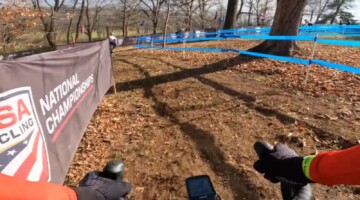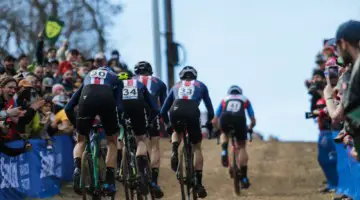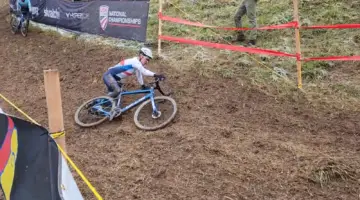Jesse Anthony is coming up on his first full year as the USA Cycling Cyclocross Manager after being hired last fall.
Thanks in part to a grant from the Rapha Foundation and the support of the USA Cycling Foundation Mud Fund, Anthony and USA Cycling were supporting a number of young riders at the Jingle Cross World Cup last month. The USA Cycling tent in the pro team area was a hive of activity, with a number of Junior and U23 women and men having access to pro mechanics, trainers and more.
Anthony described the goal of using the Jingle Cross weekend as a development tool. “The point of the trip was never about results. Obviously, we want to help them do well, but really I wanted to provide them with a taste of what it’s like to race in a supportive environment,” he said.
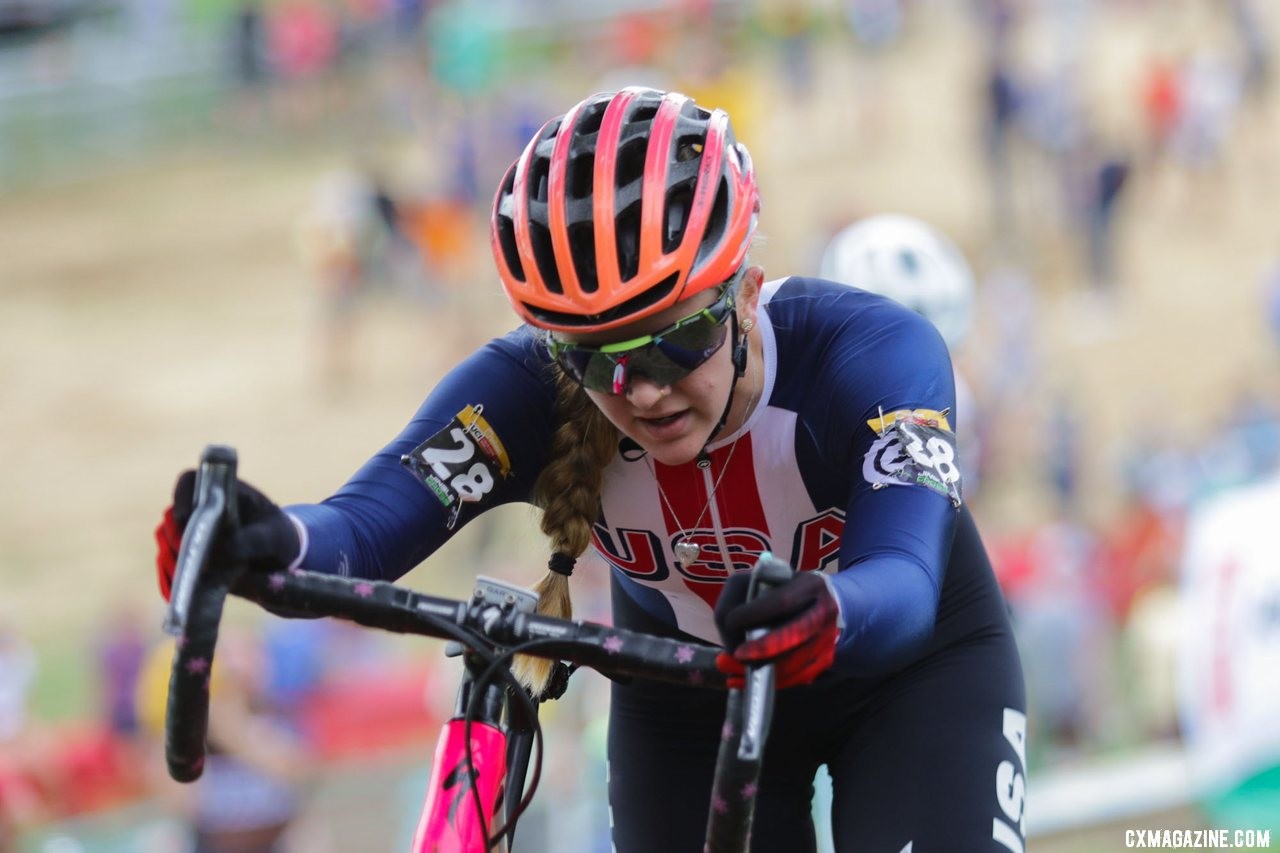
Aubrey Drummond climbs the side of Mt. Krumpit. 2019 Jingle Cross World Cup, Elite Women. © D. Mable / Cyclocross Magazine
Young riders qualified for the World Cup trip based on past results and performance at the Talent ID camps USA Cycling sponsored this past summer. Many of the young riders now have their sights set on the coming European blocks in November, December and January/February for the World Championships.
I caught up with Anthony at last month’s World Cup Waterloo for a look at the USA Cycling talent development program and how the Jingle Cross weekend went for Anthony and his team. You can read a transcript of our conversation below.
Interview: USA Cycling Cyclocross Manager Jesse Anthony
Cyclocross Magazine: We are here at World Cup Waterloo and you supported young riders at the Jingle Cross World Cup [last weekend]. How has that experience gone?
Jesse Anthony: All the young riders there had a really good experience. We got a lot of good feedback from them, and we got a lot of good feedback from the community and everyone there was pumped to see us out there and see them out there. I think they represented the program well, and most importantly, they got a great experience there.
Talent ID camps are partially talent ID—but that’s just the name—we do a little bit of that there, but it’s really a learning experience. All the coaches who run those are really good at teaching the kids so much and they had a broad range of riders.
Everyone from Lizzy Gunsalus, who’s already hooked up with the Cannondale Cyclocross World Development program—and her father has been in the sport for a while—so she has a lot of good support to people who race mountain bikes or road and say, “Oh yeah, I think ’cross looks cool, and I’ll try it.” And they come to these camps.
The camps are awesome. It’s a good place to start, and they were also the way they qualified for the racing trip. It was just really cool to see them gain some confidence and go try something and then go to a race where they probably wouldn’t have gone before.
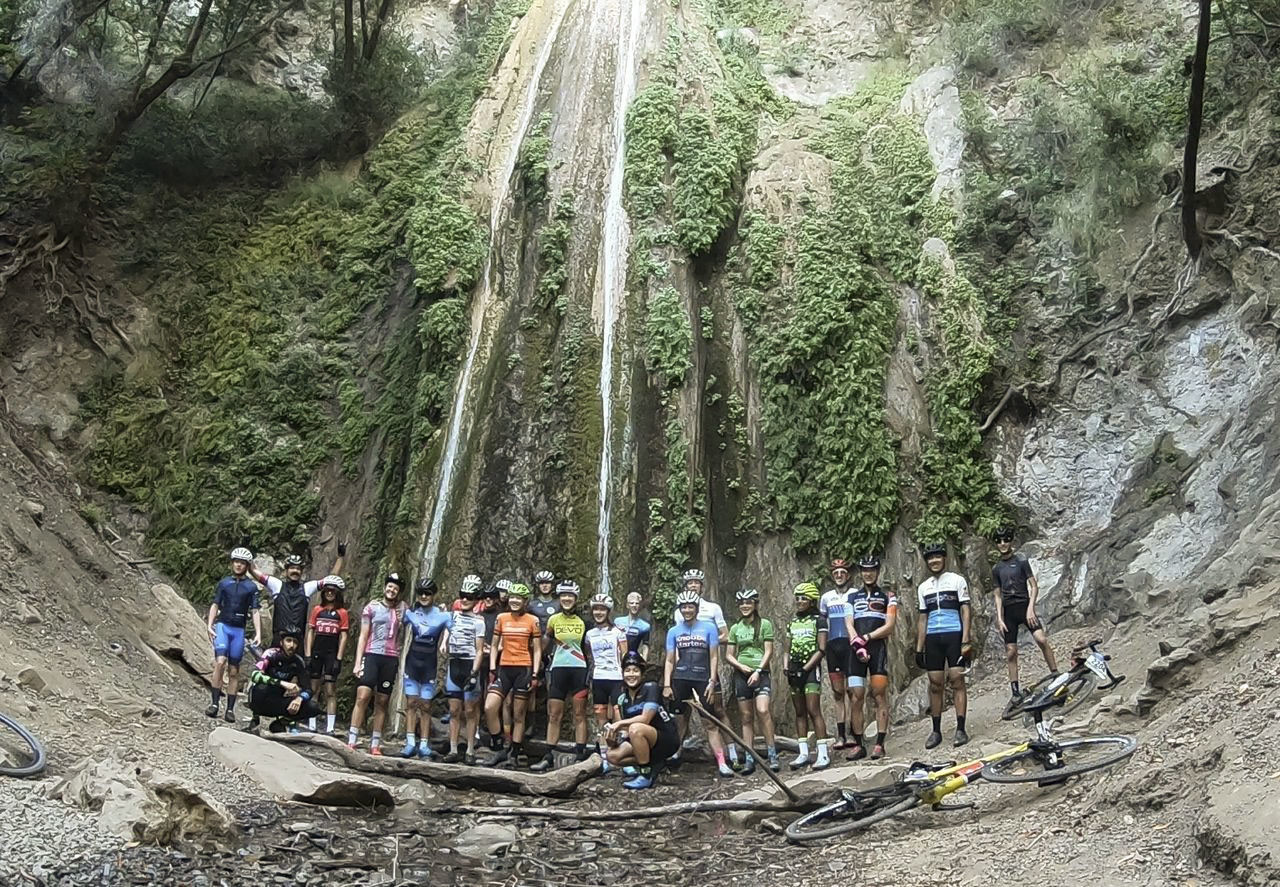
Talent ID camps are an important part of USA Cycling’s development program. 2019 SoCal USAC Talent ID Camp. © Amanda Nauman
CXM: You guys had an awesome setup at Jingle Cross. You guys were easy to find. They were obviously well supported. What are some of the more intangible things that you think this approach gave them versus obviously the experience of getting crushed by Mt. Krumpit.
JA: The point of the trip was never about results. Obviously, we want to help them do well, but really I wanted to provide them with a taste of what it’s like to race in a supportive environment. We had a sprinter van there with a professional mechanic and two coaches and we provided food and drinks for them and tents and trainers in the pro team area. We tried to make it as a high a level of support as possible so they could get a feel what it’s like to have that kind of support and just be able to focus on the race.
I also wanted to start them integrating into the development program before Europe. I wanted them to get used to communicating with me, with the team manager, with Myron, a professional mechanic, before they’re taken away from their parents and brought to a new country with weird food and people who don’t speak the language. We want to try to keep some things as similar as possible.
And so this was a great first step to bring them out of their normal environment to a race, to a big race, a high-level race, obviously, but at least we’re still in America. I think it was a great step in that direction of integrating the image of the development program and kind of providing them with an experience toward the next level.
CXM: We’re seeing the Euros here [in Waterloo]. Some of those riders grow up in really professional programs from an early age. What aspects of that are you trying to bring to development and what you’re trying to do as cyclocross manager?
JA: Well really my biggest goal with the development program is to provide opportunities. Opportunities for these riders to step into. And that’s why we kind of wrote the qualification criteria the way they are. Basically, we set the bar and once you get over the bar you’re in and then qualify for these opportunities. That’s one of the main things.
And then as far as the level of support, with the Mud Fund and especially the support from the Rapha Foundation, we do have a lot more resources to provide good support. So in the past, it’s been pretty bare-bones minimal, and the athletes have had to pay for a lot of it, but now we have the ability to lower the bar of entry fees for the riders so it’s not so much of a financial strain. So that’s big for us.
But really it’s about providing the opportunities and kind of showing and sharing those opportunities with as many riders as possible. And when I went to all the Talent ID camps this year, and we had 68 athletes at all of those camps, 21 were women, which is the biggest numbers we’ve ever had in our cyclocross camps.
They got so excited to hear about the November European trip, the Christmas trip, the World Championships and how they could qualify. So I think just sharing those experiences with them and sharing the possibility of those opportunities really motivated them and gave them some sort of incentive and an idea of what’s going on in the sport.
CXM: What’s going on for you before the November European block?
JA: We will be doing our development camp in Bentonville. It’s a full development camp, fully supported. The riders have to pay their travel, but once they get there it’s all free. We’re going to be inviting 20 riders this year. Five from each category, U23 men, U23 women, Junior men and Junior women. This was an invitation-only camp, and since it’s early in the season, it was kind of hard to see how everyone was doing, so we went a lot by the last few years’ results.
We invited the riders that we see have been on a trajectory who are most likely to be at the Worlds this year or have the best chance to qualify. And this is again a place for them to start integrating into the development program to get used to the people around the program, what the atmosphere and the attitude are and what our expectations are, which are quite low, but you know we want them to start feeling comfortable like they’re part of the program.
The U23 road program that the U.S. has had in the past and the women’s program have kind of integrated riders all year, and we want to start doing that with this camp. We want to start integrating them into our program and showing them the opportunities that are out there and also to provide an education for them that I think they wouldn’t have gotten otherwise. Again to get them out of their normal comfort zone.
We’re going to have some really cool and experienced people there from different areas like strength and conditioning. We’re going to have a really good skills coach. We’ll talk about nutrition, we’ll talk about sports psychology, we’ll talk about marketing and story-building and all that kind of stuff. We’re going to try to cover the gamut of what it’s like to be a professional athlete is and what it takes to make it in a sport.
Training is great and the preparation is great, racing results are good, but if you’re really going to be in this sport for a long time like Katie Compton or Jeremy Powers, there’s a lot more to it and the mental game is big, the emotional game is big.
Setting yourself off on the right foot at a young age is important. There are a lot of things I learned over the years, and I have a lot of great people in my life who taught me a lot of things when I was younger and now, not that I know everything, but I know a lot. I’ve been through it.
There’s a lot that I look back on and say, “Man, it would be cool if I learned this at 18.” And that’s not to criticize any of the people that helped me when I was younger. As I said, I learned a lot of great stuff, and I think a lot of these lessons are things that we’re going to talk about.
I want to just kind of integrate that, integrate them into that environment so they kind of know what they’re aiming for. What the steps are to take to keep working toward those goals.
These young athletes, some of them show up so young and are so good, like a Madigan Munro and anybody can see the special talent she is, but other athletes develop slower and kind of come into the sport later on. Look at Jeremy Powers, he didn’t win a national championship until he was an Elite in 2012. He is one of the best male cyclocross athletes we’ve ever had in the country. He was good at a young age, but he’s an example of not fulfilling his full potential until later.
With these athletes, one thing I want to really communicate and share with them is that in order to get the most out of the sport, you really got to be committed. It’s a time game. And if you really enjoy doing it, then that’s really important. Learning how to enjoy what you’re doing and staying in the game for a long time, that progression takes time.
There are a few things that make you successful in the sport, and it’s pretty simple. If you have talent and you don’t give up, you’re going to do well.
CXM: Awesome. Thanks for your time and for sharing what you’ve been up to.
JA: You bet. Thank you.























